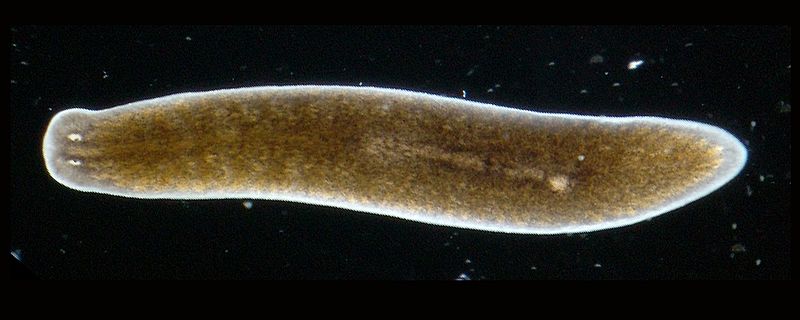
Planaria (average size 1 – 2 cm. long) (credit: Planmine, via Wikimedia Commons)
The programming in life forms as humble as planaria enables them to swim across a petri dish to the side that is out of the direct light. They use their instincts, knowledge, and/or intelligence, to improve their odds of survival by
avoiding beams of light. Bits of rock the same size as the planaria do not do this. This ability to dodge hazards and seek opportunities is what marks life.
Planaria can recognize, act, and survive in this uncertain world. How much more empowering is human programming?
Thus, the quantum view opens up the possibility of free will. We can acquire knowledge which guides our daily actions and sometimes even pass it on, by genes or memes, to our offspring.
Planaria can recognize, act, and survive in this uncertain world. How much more empowering is human programming?
Thus, the quantum view opens up the possibility of free will. We can acquire knowledge which guides our daily actions and sometimes even pass it on, by genes or memes, to our offspring.
We are, within human limits, free. Using the programs and data in our
heads, we can learn, think, and act to
increase the odds of our experiencing futures that will support our survival,
health, and comfort, and decrease the odds of our experiencing futures that will
lead us to pain, illness, injury, and death. We think, learn, and act in ways
that make it more likely that we will keep on being able to think, learn, and act.
We gain a better understanding of how profoundly different this worldview
is when we contrast it with the old Newtonian one. Philosophers who thought within
the old Newtonian worldview believed that natural laws like Newton’s laws of
motion would eventually explain all events in the realms of Physics, then Chemistry,
Biology, Psychology, and History. In this model, every event and every action
performed by animals or humans is seen as being governed by rigorous natural laws
that in each case must lead to only one outcome. Thus, only one history for the
entire universe is possible. Humans beliefs about their our own freedom are
illusions.
This view is called determinism: it says there is no such thing as free will because
the future is already set, even if no human being will ever be able to know all
the natural laws, nor the positions and momenta of all of the particles. In principle, under the Newtonian
view, there is no free will for humans or anything else.
The quantum view, by contrast, allows for the possibility that living things can learn to spot patterns in the events they see in the world around them, recognize the patterns that tell of hazards and opportunities, then act to alter the probabilities of the various possible futures so that the living things’ odds of being snuffed out decrease and the odds of their survival go up.
The quantum view, by contrast, allows for the possibility that living things can learn to spot patterns in the events they see in the world around them, recognize the patterns that tell of hazards and opportunities, then act to alter the probabilities of the various possible futures so that the living things’ odds of being snuffed out decrease and the odds of their survival go up.
That picture resonates with our habitual and intuitive
view of ourselves. We can shape future events. We are, to a degree that varies
from situation to situation, free.

climber on Spud Boy, California, USA (credit: Rsriprac, via Wikimedia Commons)

climber on Spud Boy, California, USA (credit: Rsriprac, via Wikimedia Commons)
No comments:
Post a Comment
What are your thoughts now? Comment and I will reply. I promise.